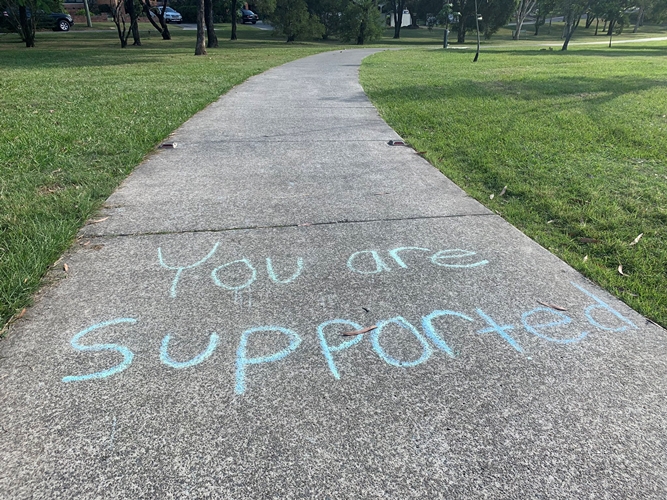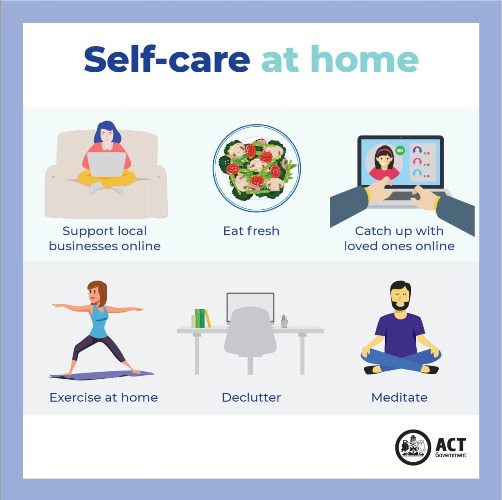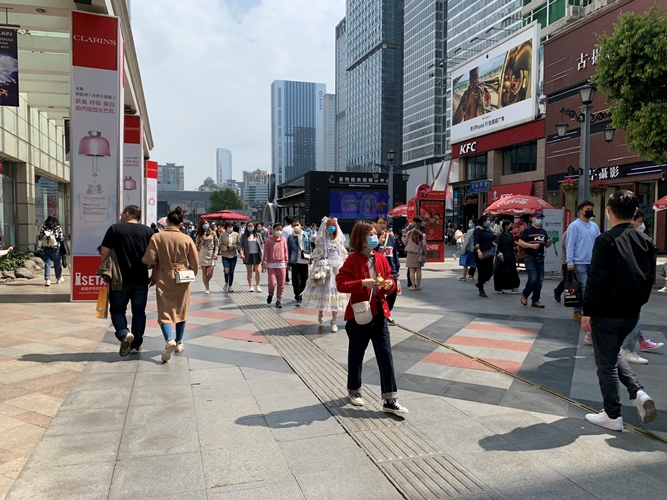Mental health during the coronavirus outbreak – what I have learnt
30 March 2020
The coronavirus outbreak has profoundly disrupted our lives. As we adjust to restricted contact with others, different ways of going about our lives and heightened concerns about hygiene to contain the virus’ spread, the mental effects can be considerable.
In Chengdu, there are constant reminders of the threat posed by the coronavirus. People wear masks, have their body temperature taken before entering venues, and see the ubiquitous signs reminding them to be vigilant and responsible for our own health and that of others. Compounding this is that we don’t know how long it will be before we can resume our normal lives.
The Consulate-General has remained open throughout the outbreak. Our community has faced unprecedented challenges but tried our best to adapt to changed circumstances. All of us have had to go through the lockdown without our families, who have returned in Australia.

Credit: Anna Hartley, ABC News
The chief way to avoid contracting the coronavirus is by good hand hygiene practices and social distancing – not being too physically close to others, and to refrain from shaking hands, hugging and other contact. But this is particularly difficult as in times of crisis when we need each other more than ever.
What this crisis has brought home to me is that human beings have an enormous capacity to adapt and look after each other. And that support makes a lot of difference. There are also lots of good advice, support and resources we can access. It is up to us though to use them in a way that suits and benefits us.
“Do not be overwhelmed by what you imagine, focus on what you can do and what you ought to do.” Marcus Aurelius, quoted by Deputy Vice-Chancellor (Research) and Professor of Political Philosophy Duncan Ivison, University of Sydney
Having lived through this process, my colleagues and I in Chengdu have learnt a few coping mechanisms that I’d like to share with you.

1. Be informed with facts
- Listen to trusted sources and experts. Links below, particularly at health.gov.au are authoritative and reliable
- The Australian Government’s digital mental health portal, Head to Health, is the single source of authoritative information and guidance on how to maintain good mental health during the epidemic, and in self-quarantine, how to support children and loved ones, and how to access further mental health services and care
- But don’t let the vast amounts of information overwhelm you
- I practise self discipline with social media – I learn that accessing it frequently doesn’t necessarily help me cope with the situation, in fact it can make me more tense.
2. Be self aware and think of others
- Don’t be guilty feeling anxious. We are allowed to feel bad, so acknowledge your concerns
- Then put them in the context of the facts you’ve learnt from trusted sources. Ask if your anxiety is proportionate to the risks. Perhaps ask if you’re underestimating your ability to cope
- Think of those around you as your reactions impact on them. Be kind and give people the benefit of the doubt if they seem overly anxious because everyone will cope in different ways
- Looking after others is just as important if only because others getting the coronavirus would endanger yourself and those you care for
- But be better than that – because, as a community, we need to look after those around us. We can’t beat this crisis alone.
3. Reach out (but don’t touch somebody)
- Social distancing means physical distancing, not social isolation. Connectedness and kinship are more important than ever during these unsettling times
- Keep communications channels open with friends and colleagues. Whether it be by video calls, social media or email, your family and friends would love to hear from you. Ask about their families and loved ones. They appreciate your asking about their welfare, and you’ll be rewarded with a terrific sense of connection and support
- In the workplace, I have continued to hold staff meetings, albeit mostly via teleconference. But I learnt that these meetings should fit to people’s changed schedules. Working from home doesn’t mean staff will be available at the same times, particularly those with children home from school
- I learnt the importance’s of maintaining informal dialogue to continue via messaging platforms such as WeChat. We share the kinds of information we would normally hear about if we were in the office, including pictures of our pets and the food we cooked
- Checking in regularly can help address isolation and disconnection.
4. Look forward and beyond
- In the depths of difficulty, we often question how we would get through this. But be assured that by working together, this too shall pass
- I found that by seeing myself as a survivor, I change my perspective and gain confidence to focus on circumstances I can control
- We will get through this crisis and our society will come out stronger on the other side.

Chengdu is coming back to life after two months of restricted movements. Credit: DFAT
These are personal strategies that we’ve employed. It is important to seek professional support if you’re feeling unsure or anxious. If you would like to talk to someone, the Australian Government has now enabled people to access mental health advice and treatment using the telephone or video conferencing under Medicare’s telehealth services. Here is a list of helpful resources.
References
https://www.healthdirect.gov.au/coronavirus-covid-19-other-questions-faqs#mental-health
https://blog.csiro.au/self-isolating-building-resilience
https://www.psychology.org.au/COVID-19-Australians
https://www.cdc.gov/coronavirus/2019-ncov/prepare/managing-stress-anxiety.html
Click here to return to the Australian Consul-General's Blog on Southwest China
